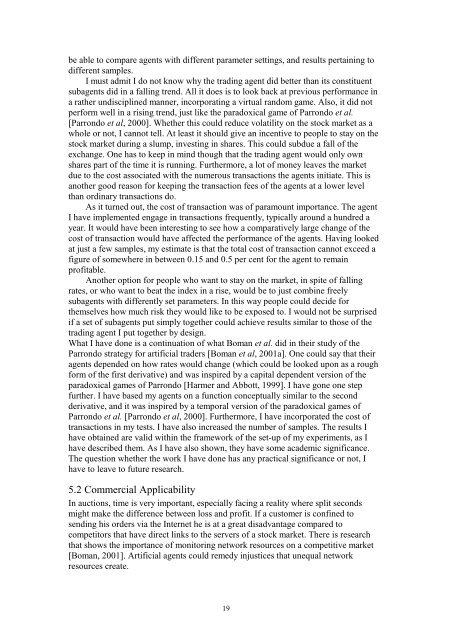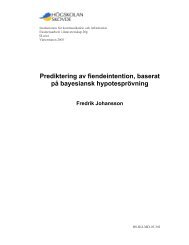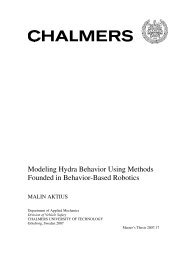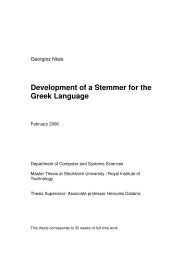Improved Pricing on the Stock Market with Trading Agents
Improved Pricing on the Stock Market with Trading Agents - SAIS
Improved Pricing on the Stock Market with Trading Agents - SAIS
You also want an ePaper? Increase the reach of your titles
YUMPU automatically turns print PDFs into web optimized ePapers that Google loves.
e able to compare agents <strong>with</strong> different parameter settings, and results pertaining todifferent samples.I must admit I do not know why <strong>the</strong> trading agent did better than its c<strong>on</strong>stituentsubagents did in a falling trend. All it does is to look back at previous performance ina ra<strong>the</strong>r undisciplined manner, incorporating a virtual random game. Also, it did notperform well in a rising trend, just like <strong>the</strong> paradoxical game of Parr<strong>on</strong>do et al.[Parr<strong>on</strong>do et al, 2000]. Whe<strong>the</strong>r this could reduce volatility <strong>on</strong> <strong>the</strong> stock market as awhole or not, I cannot tell. At least it should give an incentive to people to stay <strong>on</strong> <strong>the</strong>stock market during a slump, investing in shares. This could subdue a fall of <strong>the</strong>exchange. One has to keep in mind though that <strong>the</strong> trading agent would <strong>on</strong>ly ownshares part of <strong>the</strong> time it is running. Fur<strong>the</strong>rmore, a lot of m<strong>on</strong>ey leaves <strong>the</strong> marketdue to <strong>the</strong> cost associated <strong>with</strong> <strong>the</strong> numerous transacti<strong>on</strong>s <strong>the</strong> agents initiate. This isano<strong>the</strong>r good reas<strong>on</strong> for keeping <strong>the</strong> transacti<strong>on</strong> fees of <strong>the</strong> agents at a lower levelthan ordinary transacti<strong>on</strong>s do.As it turned out, <strong>the</strong> cost of transacti<strong>on</strong> was of paramount importance. The agentI have implemented engage in transacti<strong>on</strong>s frequently, typically around a hundred ayear. It would have been interesting to see how a comparatively large change of <strong>the</strong>cost of transacti<strong>on</strong> would have affected <strong>the</strong> performance of <strong>the</strong> agents. Having lookedat just a few samples, my estimate is that <strong>the</strong> total cost of transacti<strong>on</strong> cannot exceed afigure of somewhere in between 0.15 and 0.5 per cent for <strong>the</strong> agent to remainprofitable.Ano<strong>the</strong>r opti<strong>on</strong> for people who want to stay <strong>on</strong> <strong>the</strong> market, in spite of fallingrates, or who want to beat <strong>the</strong> index in a rise, would be to just combine freelysubagents <strong>with</strong> differently set parameters. In this way people could decide for<strong>the</strong>mselves how much risk <strong>the</strong>y would like to be exposed to. I would not be surprisedif a set of subagents put simply toge<strong>the</strong>r could achieve results similar to those of <strong>the</strong>trading agent I put toge<strong>the</strong>r by design.What I have d<strong>on</strong>e is a c<strong>on</strong>tinuati<strong>on</strong> of what Boman et al. did in <strong>the</strong>ir study of <strong>the</strong>Parr<strong>on</strong>do strategy for artificial traders [Boman et al, 2001a]. One could say that <strong>the</strong>iragents depended <strong>on</strong> how rates would change (which could be looked up<strong>on</strong> as a roughform of <strong>the</strong> first derivative) and was inspired by a capital dependent versi<strong>on</strong> of <strong>the</strong>paradoxical games of Parr<strong>on</strong>do [Harmer and Abbott, 1999]. I have g<strong>on</strong>e <strong>on</strong>e stepfur<strong>the</strong>r. I have based my agents <strong>on</strong> a functi<strong>on</strong> c<strong>on</strong>ceptually similar to <strong>the</strong> sec<strong>on</strong>dderivative, and it was inspired by a temporal versi<strong>on</strong> of <strong>the</strong> paradoxical games ofParr<strong>on</strong>do et al. [Parr<strong>on</strong>do et al, 2000]. Fur<strong>the</strong>rmore, I have incorporated <strong>the</strong> cost oftransacti<strong>on</strong>s in my tests. I have also increased <strong>the</strong> number of samples. The results Ihave obtained are valid <strong>with</strong>in <strong>the</strong> framework of <strong>the</strong> set-up of my experiments, as Ihave described <strong>the</strong>m. As I have also shown, <strong>the</strong>y have some academic significance.The questi<strong>on</strong> whe<strong>the</strong>r <strong>the</strong> work I have d<strong>on</strong>e has any practical significance or not, Ihave to leave to future research.5.2 Commercial ApplicabilityIn aucti<strong>on</strong>s, time is very important, especially facing a reality where split sec<strong>on</strong>dsmight make <strong>the</strong> difference between loss and profit. If a customer is c<strong>on</strong>fined tosending his orders via <strong>the</strong> Internet he is at a great disadvantage compared tocompetitors that have direct links to <strong>the</strong> servers of a stock market. There is researchthat shows <strong>the</strong> importance of m<strong>on</strong>itoring network resources <strong>on</strong> a competitive market[Boman, 2001]. Artificial agents could remedy injustices that unequal networkresources create.19





